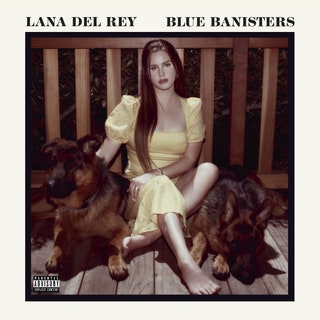Review: Lana Del Rey – “Blue Banisters”

Lana Del Rey releases her second album of the year, “Blue Banisters”.
October 27, 2021
Nothing says moody Autumn like a melancholy Lana Del Rey album. On Oct. 22, Lana Del Ray came out with her second album of the year, “Blue Banisters,” to cater to the sad women of our generation. She may be predictable, but at least she’s good at what she does, and what she does is make girls cry.
This album is what I expected it to be: a pity party about past relationships. I continue to enjoy this album, but I cannot deny that all the songs sound pretty similar. That is, except for “Interlude – The Trio.” Maybe I’m not cool enough or just don’t understand the brilliance, but it really did not fit the ambiance of the album. There are many important things in this album, and that is not near one of them.
I give all props to Del Rey for opening up about her relationship with her parents throughout the album. In one of my favorite songs, “Text Book”, she makes references to her daddy issues and how this has affected her romantic life, saying: “I didn’t even like myself, or the life I had. And there you were with shining stars.” This is one of the many relatable messages to listeners and the reason her specialty is hitting you where it hurts.
Despite the solemn mood of the album, several points were empowering. Del Rey is a poet, lacing messages of self-love and feminism into her lyrics. In the song “Blue Banisters,” Del Rey writes about the man that she expected to follow the typical masculine role of a boyfriend, painting her banisters blue; a metaphor for being someone to lean on. However as the song goes on, Del Rey sings: “Now when the weather turns to May, all my sisters come to paint my banisters green.” This symbolizes finding yourself and the power of female friends in being your true rock.
In the world we grew up in among romantic comedies and unrealistic ideas of love, women learn that there is no prince charming the hard way. Del Rey goes through this in “Violets for Roses”. She sings: “Ever since I fell out of love with you, I fell back in love with me”. This theme of self-love and not trading your violets (organic traits and quirks) for roses (expectations from your toxic partner and society) is shown here specifically, but also is the inspiration behind many different lines throughout the album.
These valuable messages are what override the downfall of the patterns in each song. I’m no musician and could not tell you where it exactly lacks variability, but they all do sound similar.
Listeners get no breaks from crying, and we aren’t mad about it. Lana Del Rey is surely not for everyone, but that’s common in alternative music. However, her voice is beautiful and her messages can reach many audiences. This album is for fellow Phoebe Bridgers lovers who need to expand their sad girl alternative playlist. I don’t love it, but I genuinely like it. I’m sure I’ll like it even more when I get my heart broken.

























